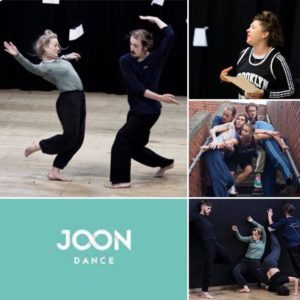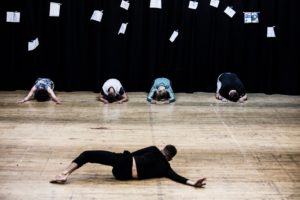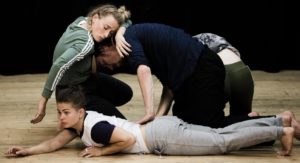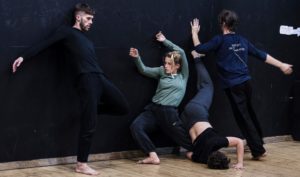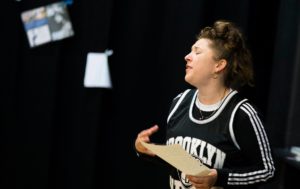A note on Joon Dance’s Tongues: This performance was shown as work in progress, the result of a period of research and development. It is a collaboration between Joon Dance, spoken word artist Rufus Mufas and young people in the community.
Tongues is coming in on a swell of excellent work for and with young people in Wales. Theatre Iolo’s excellent Platfform initiative is nurturing artists to make engaging, demanding work for and with young people, such as Tin Shed Theatre’s Boxes and 2016 by Paul Jenkins and Tracey Harris. Even National Theatre Wales is getting in on the act with We’re Still Here making great use of a community cast, including several young people, given strong moments within professional production to connect with an audience and have their voices hear. The UK as a whole is really seeing a shift in how we make and present work for young audiences, with growing recognition that they deserve as dynamic and diverse program of work as older audiences, and that by nurturing the next generation of young creatives we can ensure this program of work continues to be made in the future.
Billed as “A public performance on the Friday at 6.30pm to showcase the piece of work developed through the week.” Tongues was the culmination of a week’s work with young people from the community around Chapter, for them to,
“Find your voice this summer with TONGUES. Ever wanted to speak out about what’s important to you? Like dancing or interested in performing? Together we will create a dance and spoken-word performance unique to you and your community.”
Its ambition is to fit neatly in to this growing landscape of diverse, young people led work. I feel this is important. Tongues is big ideas and big promises.
Tongues also opens with a promise to the audience. Well. A promise and a provocation. Upon being seated we are asked what “Canton is”. Our answers are written down and posted on the wall at the back. All the while bodies slowly writhe on stage like pupae waiting for the performance to begin. Before the show starts we are told our voices matter, that we are as much a part of this as the performers.
Tongues is ultimately a promise to give voice to its young people and its audience.
It’s a promise it breaks.
The performance, to be absurdly reductive, consisted of three halves (try working that one out, ha!). Live dance, spoken word and live sound mixing using audio captured from around Canton.
The opening number involved the young people dancing across the stage, with the most infectious, magnetic smiles I’d seen in a long time. Loving performance, loving being there, I was utterly delighted to be spending the next hour in their company. Even more so when they picked up the mic and started expressing their truths about the world.
What a tragedy to see them spend the majority of the performance sat at the back of the stage as the adults performed for them, spoke for them and made music for them.
What a missed opportunity to have three exciting live mediums, built on passion and emotion, to be performed in such a monotone and belaboured manner, and to not have the mediums play together and enhance the expression of each. I so desperately wanted them to react to each other, to find a voice together. I also had a particular note for whoever performed the majority of spoken word – they held the mic too close to their mouth making it difficult to understand, and the lack of variation in delivery made it hard to focus on what was being said. If the words came from young people let them speak!
And how great would it have been if our answers to “Canton is” had been included in the piece instead of involving us at the start only to be ignored for the rest of the performance.
The adults performing the work have worked hard and take great joy in what they do, and are clearly incredibly proud of the potential of the work.
It just needs to decide whether it is work for and by young people, in which case they need to be front and centre, or whether to use young people’s experiences as provocations for professional artists to create work around. A great deal of what I said can be addressed simply by changing how the work is framed to the audience.
I see great potential in this work and would love to see a more developed version, one that embraces its liveness and the unrefined, magnetic joy and passion of the young people on which it has built its foundation. Please do not take their voices away.
Unfortunately, The work is just not there yet. It is however an excellent, and exciting concept, one that is using mediums that resonate with young people in ways that traditional theatre doesn’t, so I am incredibly hopeful that the work will become something important and vital.

